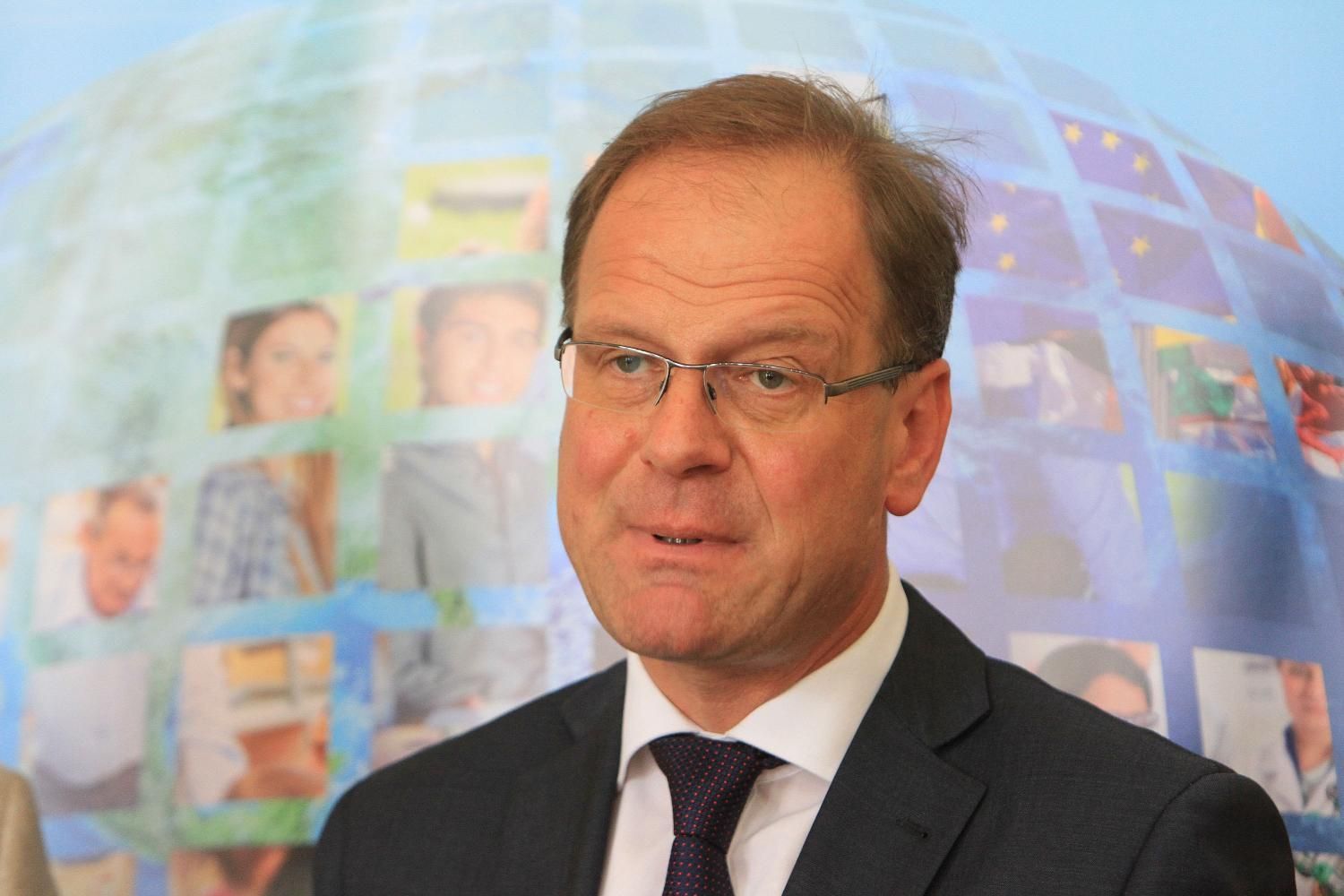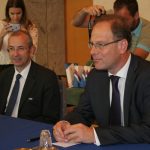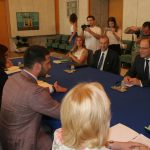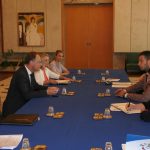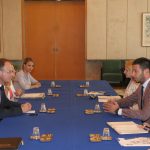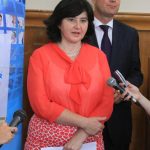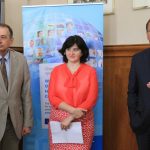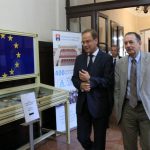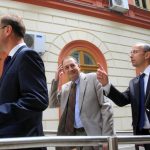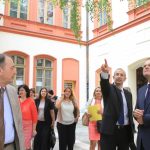Serbian Minister without portfolio in charge of European integration Jadranka Joksimovic and European Commissioner for Culture, Education and Youth Tibor Navracsics said Monday that areas covered by Commissioner’s post were the best possible foundation to build cooperation with EU on.
Joksimovic said Serbia was very active in culture and youth Erasmus+ programme within EU science programme Horizon 2020.
As she put it, key precondition for sustainable economic reforms carried out by the Government was to continue education reform and further development of economy based on knowledge, innovation, and market needs.
Joksimovic said Serbia played an active political role as well, by promoting youth exchange in the region within Berlin Process, reads the statement by Serbian Government
She said she hoped that future would bring an even greater exchange of young people and students between Serbia and EU countries.
Navracsics said that Serbia was EU’s best partner among the countries in the region and said he expected to see the cooperation become even more successful.
They agreed that in times of economic crisis, cooperation in the area of culture, education, sports and youth had a major role in EU foreign policy because, despite its low visibility, it contributed to establishment of stronger ties among countries.
During his stay in Belgrade, Commissioner Navracsics also visited Faculty of Philology and spoke to representatives of the Faculty that has recently been equipped with state-of-the-art equipment designed for simultaneous interpretation, obtained thanks to EU Tempus REFLESS Project.
Commissioner then toured renovated parts of the building of Rectorate of the University of Belgrade where he talked to Prof. Vladimir Bumbasirevic, Rector of Belgrade University.
He also met Serbian lecturers who have taken part in eTwinning platform.
INFORMATION ABOUT EU-FUNDED PROJECTS
About REFLESS project
Reforming Foreign Language Studies in Serbia (REFLESS) Project was funded through the EU Tempus programme and implemented in the period December 2010- December 2014. The project helped to establish 4 new master degrees in Serbia which are very relevant for the Serbian accession process and multilingual education policy
○ two master degrees in Conference interpreting and translation based purely on practical skills and competences (Universities of Belgrade and Novi Sad). The course is taught in line with professional standards set by the EC Directorate-General for Interpretation (DG SCIC) and their services. Starting from the academic year 2015/6, this course will form competent, high quality translators and interpreters for the EU integration process.
○ two master degrees in Serbian as a Foreign Language (Universities of Belgrade and Novi Sad). Through the project, Serbia became a member of ECML (European Centre for Modern Languages, Council of Europe) and further developed language education policy at national level and teaching methods in line with European standards.
The project gathered 18 partner institutions including philological faculties of Serbian universities in Belgrade, Novi Sad, Kragujevac, Nis and Novi Pazar, EU universities from France, Austria, Slovakia and the UK, 4 Chambers of Commerce, National Employment Service and the Ministry of Education.
About EU HETIP project
Through the project “Improving Higher Education Infrastructure in Serbia – EU HETIP”, the European Union assisted the Ministry of Education, Science and Technological Development to improve the infrastructure of 27 faculties at five state universities in Serbia with a donation of EUR 30 million.
The project funded the renewal of laboratories, research cabinets, study rooms and communal facilities in Belgrade, Novi Sad, Kragujevac, Niš, Kraljevo, Novi Pazar, Bor, VrnjačkaBanja, Čačak, and Leskovac. The project also provided standard teaching, specific scientist and modern ICT equipment to 27 high education institutions.
The two-year long EU HETIP project was officially closed in the premises of the Rectorate of the Belgrade University (Captain Misa’s Palace) in October 2014. The building also benefitted from a EUR 1 million donation. The works included the reconstruction of the facade and the roof, renovation of windows and construction of a panoramic lift which enables persons with disabilities to move freely around the building. Through the project, the EU also funded the renovation of the Botanical Garden “Jevremovac” in Belgrade, worth EUR1.4 million. After two years, the gardens were re-opened to the public in October 2014.
About e-Twinning
eTwinning is the internet platform launched in 2005 within the European Commission’s eLearning Programme, as an action for staff (teachers, head teachers, librarians etc.) working in primary and secondary schools and kindergartens. It enables them to communicate, collaborate, develop projects and share ideas and best practices. Serbia jointed eTwinning in January 2015. Currently there are close to 500 teachers registered as users of the portal, who are actively involved in various eTwinning projects.
- Mesto: Beograd Datum: 13.07.2015 Dogadjaj: EVROSERVIS/DRUTVO/SPORT – susret ministra omladine i sporta Srbije Vanje Udovièiæa sa evropskim komesarom za prosvetu, kulturu, omladinu i sport Tiborom Navraèiæem Licnosti: Vanja Udovièiæ, Tibor Navraèiè, Majkl Davenport
- Mesto: Beograd Datum: 13.07.2015 Dogadjaj: EVROSERVIS/DRUTVO/SPORT – susret ministra omladine i sporta Srbije Vanje Udovièiæa sa evropskim komesarom za prosvetu, kulturu, omladinu i sport Tiborom Navraèiæem Licnosti: Vanja Udovièiæ, Tibor Navraèiè, Majkl Davenport
- Mesto: Beograd Datum: 13.07.2015 Dogadjaj: EVROSERVIS/DRUTVO/SPORT – susret ministra omladine i sporta Srbije Vanje Udovièiæa sa evropskim komesarom za prosvetu, kulturu, omladinu i sport Tiborom Navraèiæem Licnosti: Vanja Udovièiæ, Tibor Navraèiè, Majkl Davenport
- Mesto: Beograd Datum: 13.07.2015 Dogadjaj: EVROSERVIS/DRUTVO/SPORT – susret ministra omladine i sporta Srbije Vanje Udovièiæa sa evropskim komesarom za prosvetu, kulturu, omladinu i sport Tiborom Navraèiæem Licnosti: Vanja Udovièiæ, Tibor Navraèiè
- Mesto: Beograd Datum: 13.07.2015 Dogadjaj: EVROSERVIS/DRUTVO/SPORT – susret ministra omladine i sporta Srbije Vanje Udovièiæa sa evropskim komesarom za prosvetu, kulturu, omladinu i sport Tiborom Navraèiæem Licnosti: Vanja Udovièiæ, Tibor Navraèiè
- Mesto: Beograd Datum: 13.07.2015 Dogadjaj: EVROSERVIS/DRUTVO/POLITIKA – evropski komesar za obrazovanje, kulturu, mlade i sport Tibor Navraèiæ u obilasku renovirane zgrade Rektorata Univerziteta u Beogradu (BU) Licnosti: Vladimir Bumbaireviæ – rektor BU, Tibor Navraèiæ (Navracsics Tibor)
- Mesto: Beograd Datum: 13.07.2015 Dogadjaj: EVROSERVIS/DRUTVO/POLITIKA – izjave za medije rektora BU Vladimnira Bumbaireviæa i evropskog komesara za obrazovanje, kulturu, mlade i sport Tibora Navraèiæa tokom obilaska renovirane zgrade Rektorata Univerziteta u Beogradu (BU) Licnosti: Vladimir Bumbaireviæ, Tibor Navraèiæ (Navracsics Tibor),
- Mesto: Beograd Datum: 13.07.2015 Dogadjaj: DRUTVO/POLITIKA – izjava za medije evropskog komesara za obrazovanje, kulturu, mlade i sport Tibora Navraèiæa tokom obilaska renovirane zgrade Rektorata Univerziteta u Beogradu (BU) Licnosti: Tibor Navraèiæ (Navracsics Tibor)
- Mesto: Beograd Datum: 13.07.2015 Dogadjaj: DRUTVO/POLITIKA – izjava za medije evropskog komesara za obrazovanje, kulturu, mlade i sport Tibora Navraèiæa tokom obilaska renovirane zgrade Rektorata Univerziteta u Beogradu (BU) Licnosti: Tibor Navraèiæ (Navracsics Tibor)
- Mesto: Beograd Datum: 13.07.2015 Dogadjaj: DRUTVO/POLITIKA – Tibor Navraèiæ, evropski komesar za obrazovanje, kulturu, mlade i sport u obilasku renovirane zgrade Rektorata Univerziteta u Beogradu (BU) Licnosti: Tibor Navraèiæ (Navracsics Tibor)
- Mesto: Beograd Datum: 13.07.2015 Dogadjaj: EVROSERVIS/DRUTVO/POLITIKA – evropski komesar za obrazovanje, kulturu, mlade i sport Tibor Navraèiæ u obilasku renovirane zgrade Rektorata Univerziteta u Beogradu (BU) Licnosti: Vladimir Bumbaireviæ – rektor BU, Tibor Navraèiæ (Navracsics Tibor)
- Mesto: Beograd Datum: 13.07.2015 Dogadjaj: EVROSERVIS/DRUTVO/POLITIKA – evropski komesar za obrazovanje, kulturu, mlade i sport Tibor Navraèiæ u obilasku renovirane zgrade Rektorata Univerziteta u Beogradu (BU) Licnosti: Tibor Navraèiæ (Navracsics Tibor), Vladimir Bumbaireviæ – rektor BU, Majkl Davenport (Michael Davenport) – ef Delegacije EU u Srbiji
- Mesto: Beograd Datum: 13.07.2015 Dogadjaj: EVROSERVIS/DRUTVO/POLITIKA – evropski komesar za obrazovanje, kulturu, mlade i sport Tibor Navraèiæ u obilasku renovirane zgrade Rektorata Univerziteta u Beogradu (BU) Licnosti: Tibor Navraèiæ (Navracsics Tibor), Vladimir Bumbaireviæ – rektor BU, Majkl Davenport (Michael Davenport) – ef Delegacije EU u Srbiji
- Mesto: Beograd Datum: 13.07.2015 Dogadjaj: EVROSERVIS/DRUTVO/POLITIKA – evropski komesar za obrazovanje, kulturu, mlade i sport Tibor Navraèiæ u obilasku renovirane zgrade Rektorata Univerziteta u Beogradu (BU) Licnosti: Vladimir Bumbaireviæ – rektor BU, Majkl Davenport (Michael Davenport) – ef Delegacije EU u Srbiji, Tibor Navraèiæ (Navracsics Tibor)

